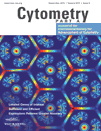
Experiment Overview
| Repository ID: | FR-FCM-Z5YT | Experiment name: | Early response evaluation in AML | MIFlowCyt score: | 21.00% |
| Primary researcher: | Benedicte Tislevoll | PI/manager: | Benedicte Tislevoll | Uploaded by: | Benedicte Tislevoll |
| Experiment dates: | 2016-06-01 - 2023-02-28 | Dataset uploaded: | Feb 2022 | Last updated: | Feb 2022 |
| Keywords: | None | Manuscripts: | [36611026] [PMC9825407] | ||
| Organizations: |
Bergen University, Clinical medisin, Bergen, Outside U.S./Canada (Norge)
|
||||
| Purpose: | Background: A fundamental hallmark of cancer cells is their ability to sustain proliferative signaling and cell survival, reflected in a cellular chemotherapy response that is poorly understood. We questioned whether chemotherapy modulated phospho-signaling at 4 and 24 h in vivo could provide information about long-term survival in acute myeloid leukemia (AML), and if the signaling response to therapy was more informative than analysis at time of diagnosis. Methods: Peripheral blood was collected from 32 younger AML patients (age 16-74 years), before, 4- and 24 hours after start of induction chemotherapy. Samples were analyzed by 36-dimensional mass cytometry for assessment of alterations in immunophenotypes and intracellular signaling using unsupervised and supervised machine learning approaches. Results were validated by RNA sequencing and mass spectrometry proteomics (Super SILAC). Targeted sequencing was used to characterize patient samples for recurrent AML mutations. Drug sensitivity and resistance testing ex vivo was compared to activation of relevant signal transduction pathways and mutational profile. Findings: 5-year patient survival was accurately predicted in the leukemic cell population at 24 hours after therapy onset by phospho-proteins p-ERK1/2 (T202/Y204) and p-p38 (T180/Y182). RNA sequencing showed induction of MAPK target gene expression and the AP-1 transcription complex in patients with high p-ERK1/2. Super-SILAC proteomics confirmed an increase in the abundance of p38 prime target MAPKAPK2(MK2) 24 hours after start of induction therapy. Ex vivo drug sensitivity testing demonstrated high sensitivity to MEK inhibitors in the patient cells with high p-ERK1/2 measured at diagnosis or 24 hours after start of chemotherapy. Interpretation: Early single cell signaling response to chemotherapy provided precise prognostic information independent of stratification by genetics. We propose that early functional measurement of chemotherapy-potentiated MAPK pathway signaling could identify non-responders to intensive chemotherapy allowing precise treatment adjustment. | ||||
| Conclusion: | None | ||||
| Comments: | All fcs files in this experiment have been normalized with the CytoNorm approach and compensated by the Catalyst pipeline, as described in the methods section of the manuscrpt. The key to link each file to the patient ID in the manuscript is added as an attachment. | ||||
| Funding: | Not disclosed | ||||
| Quality control: | None | ||||
